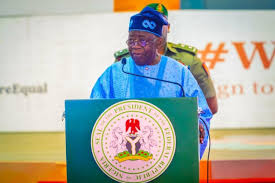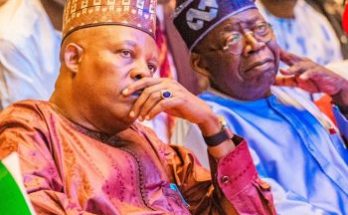The world is in a health emergency but NIGERIA has no working health care system. No matter how rich a country is, it cannot be healthy without a working health care system.
The greatest asset to a nation is not its revenue but its health care system.
The secretary to the government of the federation (SGF) Mr Boss Mustapha was profoundly honest when he admittted that the country’s health care is in a precarious situation. At a recent public hearing with members of the National Assembly, the SGF raised dust when he made an eye-catching and tongue-whacking statement. He said ‘I can tell you for sure, I never knew that our entire healthcare infrastructure was in the state in which it is until I was appointed to do this work (Chairman PTF COVID 19).
This statement coming from a top government official as the SGF sums up the inherent decay in Nigeria’s health sector.
As a result of the lack of a working health care system, our dear country has to resort to a fire brigade approach in tackling the COVID 19 pandemic. There has to be continuous prayers not only for an end to COVID 19, but also that the pandemic doesn’t get to the grassroots villages and towns where medical facilities are non-existent. Our dear country has no working health care system, no motivated/sufficient medical doctors and nurses and near-complete was absence of health care infrastructure, it has to import Chinese doctors. Hence, the nation has to beg for ventilators, protective gowns and test kits from foreign allies.
China’s richest man Jack Ma’s philanthropy came handy for Nigeria when he donated 100,000 face masks, 1,000 protective gowns and 20,000 test kits. These donations are good, thanks to Jack Ma but they raise up a squall when juxtaposed with the fact that Nigeria as the world’s 6th largest oil producer has to rely on donations of even the most basic equipment such as face masks. Nigeria should be the one donating face masks to its sister African countries. While Nigeria waits for donations of face masks from its international partners and people of goodwill, there are some state governments in Nigeria that have no single ventilator but currently maintain over 250 special utility vehicles (SUVs) for government officials.
There is this trending narrative of a current state governor in one of the poorest states in Nigeria which has no single ventilator who recently allegedly spent N600 million of state funds to purchase luxury special utility vehicles (SUVs) for emirs in his state.
The federal government needs to increase its spending in the health sector as the N427.3 billion allocated to health in the 2020 budget which translates to N2,000 for the health of every Nigerian in 2020 is grossly inadequate.
Of course Nigeria has to import Chinese medical doctors. Do we have any choice in the face of our shambolic health care system? The imported Chinese doctors to assist in the fight against COVID 19 further demonstrates the sorry state of Nigeria’s health sector.Nigeria simply lacks the capacity to effectively tackle the COVID 19 pandemic hence the country has to seek medical assistance just as it seeks financial assistance from its international allies.
Asking for medical help from China can be viewed along the same line as asking for financial assistance from the EU, IMF and the world bank. Nigeria currently has no working health care system and the country lacks the sufficient number of qualified medical doctors, nurses, pharmacists and other medical professionals to effectively tackle the COVID 19 pandemic hence the need for foreign experts from China and elsewhere.
Currently, there are 72,000 medical doctors registered with the medical and dental council of Nigeria (MDCN) out of which only 48,000 are practising in the country. The rest have emigrated to work abroad. With a population of about 200 million, Nigeria has a ratio of one medical doctor to 5,000 people which is grossly inadequate compared to the WHO global standard of 1 medical doctor to 600 people. The US has a ratio of 13 medical doctors to 5,000 people while the UK has 14 to 5,000 people.
Nigeria’s medical doctors are demotivated by several challenges including poor equipment, lack of an enabling environment and low pay. The average monthly take home pay of a medical doctor in Nigeria is N200,000 (£460) which is not good enough compared to the average annual take home pay of a medical doctor in the UK (£55,000 – £100,000). Little wonder that 9 out of every 10 medical doctors in Nigeria are in continuous job search to enable thememigrate abroad. From available statistics, only one out of 10 medical doctors in Nigeria wants to stay and work in the country.
Nigeria’s medical doctors and nurses end up leaving the country in the spirit of ‘brain drain’ as the country lacks even the basic health care infrastructure and cannot pay them well. Nigeria has spent over £2bn (about 900 billion) since 2010 to train indigenous medical doctors abroad only for these doctors trained with state funds to end up emigrating to UK, US, the middle East and several other countries.
THE SOLUTION:
The solution lies in the implementation of a grassroots-based nursery heath care system (NHCS) with particular emphasis on our village communities at the root of the grassroots.
Under the proposed NHCS, the federal, state and local governments should partner to build the following health infrastructure:1. One well-equipped health dispensary in each of the 5,972 wards in the country. 2. One federal medical centre in each of the 774 local government areas.3. One state specialist hospitals in each state capital. 4. The national hospital in Abuja should be further equipped to handle medical cases that cannot be treated at the state specialist hospitals.
Under the NHCS, the federal government should engage the private sector through a public private partnership (PPP) to build medical schools and nursing schools across the country. The federal government doesn’t need money for the PPP but can use the 70 federal medical centres (FMC) in the country as counterpart funding in the proposed PPP for medical schools by offering these FMCs for use in the clinical part of the medical course.
This health infrastructure in the NHCS coupled with a motivated and sufficient number of medical doctors and nurses will not only assist to tackle pandemics such as COVID 19 in the future but also ensure that Nigeria can effectively tackle ongoing pandemics in Nigeria such as malaria which kills 330,000 people in the country annually. It is reported that in the COVID 19 pandemic, malaria has killed over 1,000 people in Nigeria but overshadowed by the COVID 19 pandemic.
A sustainable health care system in Nigeria will also stop the obnoxious medical tourism which costs NIGERIA huge amount of money.
LESSONS OF COVID 19.The adversities of COVID 19 can be turned into opportunities for a new era of good governance in Nigeria.Indeed, COVID 19 can be the turning point for a more purposeful leadership in our dear country. Our country was on silent mode when COVID 19 erupted and suddenly there is government. Everyone woke up including public spirited individuals who came alive with cash donations all over the place. Apart from the wake up call in the health sector, COVID 19 also reminds us that government in Nigeria can do more if it wants to. The lessons also underscore the need for both small and big corporations to partner with government in community development and in the spirit of corporate social responsibility. National development needs to shift to the grassroots because that is where majority of people live. They deserve the good life as well. There are communities in Nigeria where there is complete absence of government. No hospitals, no primary schools, no roads, no pipe borne water, no sign of government. In this 21st century, pregnant women are ferried on wheelbarrows to very long distances for ante-natal care.
COVID 19 underscores the inherent inefficiency, lapses and even corruption in the social investment programme (SIP). Of course, a sustainable and successful SIP cannot be achieved without an automated database. A database of not only the most vulnerable families but all citizens in the country is critical to the implementation of the highly commendable SIP programme. The 3.6 million families currently enjoying the programme are grossly inadequate in a country with a population of 200 million. The SIP should continue to get better as Nigerians look forward to at least 100 million citizens (50% of the population) enjoying the SIP programme. Government must not go back to sleep after COVID 19.




